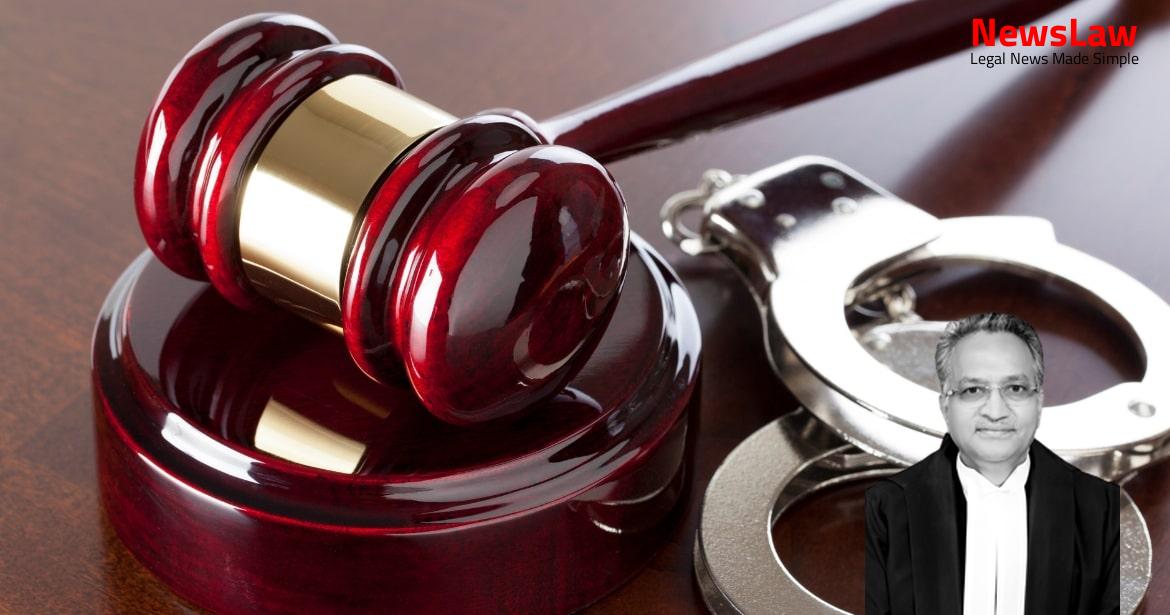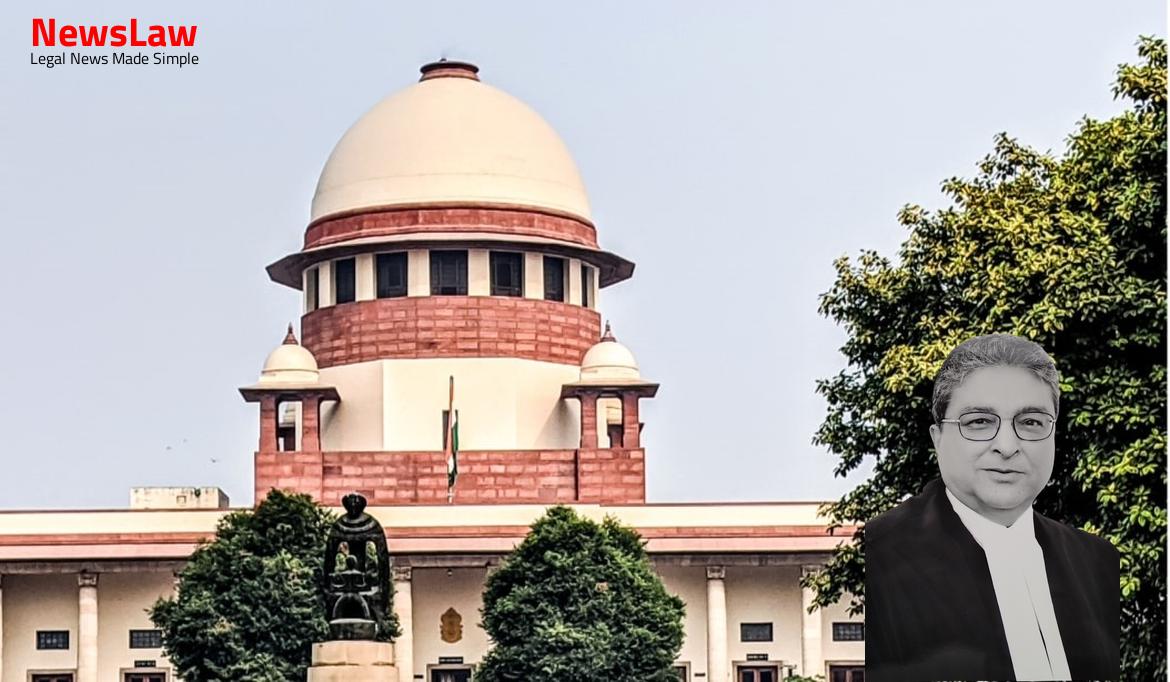In a significant development, the Supreme Court of India has delivered a crucial judgement in the matter of In Re: Arbitration Petition No 19 of 2024. The ruling addresses the complex issue of involving non-signatory parties in arbitration agreements, impacting the interpretation and application of arbitration laws in India. This decision marks a milestone in legal discourse regarding arbitration proceedings and sets a new standard for resolving disputes involving multiple parties.
Facts
- SRG and Millennium are ready to purchase the stake of AMP in Millennium at the previously agreed price.
- The purchase will be funded by the compensation SRG receives for handling Deegee over the past 20 years.
- Mr. Upen Shah is appointed as AMP’s representative for arbitration as per the FAA.
- Discussions regarding Millennium and Deegee matters need to involve Mr. Samarjitsinh from the SRG Group.
- Various disputes between AMP, JRS, and SRG groups led to legal proceedings before the NCLT.
- Amendment of Aurosagar Lease Deed and costs borne by AMP Group.
- Exit of JRS Group and SRG from Deegee Software outlined.
- Additional phases and actions for Millennium and Deegee exits detailed.
- Involvement of individuals, companies, and shareholders in the FAA dispute.
- FAA amendments and ongoing negotiations mentioned.
- Mediation attempts between AMP, JRS, and SRG groups described.
- Proposed buyouts and exits from Deegee and Millennium by SRG and JRS groups.
- Key individuals involved in negotiations and proceedings highlighted.
- JRS Group and SRG Group nominated Justice Kalpesh S. Jhaveri as the sole arbitrator for disputes with AMP Group.
- Justice Akil Kureshi was suggested as an arbitrator for disputes between AMP, JRS, and SRG Groups under the FAA.
- The appointment of a sole arbitrator could not be agreed upon within 30 days, leading to the filing of Arbitration Petition No 19 of 2024 by AMP Group.
Also Read: Important Judgment on Child Pornography Laws: Harish v. State of India
Issue
- The Chief Justice or his designate will have to decide whether the party making the application approached the appropriate High Court.
- The decision will involve determining if there is an arbitration agreement in place.
- The Chief Justice or designate will also need to determine if the party applying under Section 11 of the Act is a party to the arbitration agreement.
Also Read: Interpretation of Group of Companies Doctrine in Indian Jurisprudence
Arguments
- The Petitioner (AMP Group) argues that the SRG Group should be a party to the arbitration agreement even though they are not signatories to the Family Arrangement Agreement (FAA) due to their participation in negotiations and discussions.
- The Petitioner cites instances where the SRG Group was involved in meetings related to the FAA, suggesting their implied consent to be part of the arbitration proceedings.
- They claim that the SRG Group’s involvement was necessary for the successful implementation of the FAA, indicating their understanding of being bound by its terms.
- The Petitioner argues that the SRG Group should be considered a party to the arbitration agreement based on factual evidence and application of legal doctrine, as per the settled position in legal precedents.
- Despite disputes and negotiations involving the SRG Group, the Petitioner states that the SRG Group did not appoint or authorize anyone to represent them in the agreements between the AMP and JRS Groups.
- The Petitioner asserts that the AMP and JRS Groups can fulfill their obligations under the FAA without the presence or role of the SRG Group.
- The counsel argued that the prima facie threshold required for joinder of non-parties to arbitral proceedings has not been met in the present case
- It was emphasized that neither the referral court nor the arbitral tribunal had sufficient grounds to justify the joinder of non-parties
- The analysis of the situation led to the conclusion that the criteria for joinder were lacking in the current context
Also Read: Case of Defamation and Caste-based Humiliation: High Court Upholds Special Judge’s Decision
Analysis
- Parties must notify each other as soon as practicable regarding any dispute
- Parties must provide details of the dispute and designate a representative for negotiations
- Parties must cooperate for actions required to give effect to the dispute resolution process
- Chief Justice or his designate may decide whether a claim is dead or live
- Chief Justice or his designate may determine if parties have concluded the contract by recording satisfaction of their rights and obligations
- Issues exclusively for the Arbitral Tribunal include determining if a claim falls within the arbitration clause and deciding on the merits of any claim
- Chief Justice or designated Judge can appoint an arbitrator qualified under Section 11(8) of the Act upon seeking the opinion of an institution if needed
- The Court discussed the interplay between Section 11 of the Arbitration Act, 1996 and the role of the Arbitral Tribunal in determining the existence of an arbitration agreement involving non-signatory parties.
- Highlighted the complexity in determining the consent of non-signatory parties to be bound by the arbitration agreement through conduct and relationship with signatories.
- Emphasized the importance of the Arbitral Tribunal in deciding the jurisdictional issue regarding non-signatory parties based on factual evidence and legal doctrine.
- Noted the legislative intent behind the amendments to the Act, particularly Section 11(6A), to streamline the referral court’s role in examining the existence of an arbitration agreement.
- Pointed out the limited scope of the referral court in deciding preliminary issues related to the arbitration agreement, leaving detailed factual inquiries to the Arbitral Tribunal.
- Discussed the implications of conduct and involvement of non-signatory parties in the negotiation and performance of the contract containing the arbitration agreement.
- Highlighted the significance of the Arbitral Tribunal’s jurisdiction in determining the true parties to an arbitration agreement, as provided under Section 16 of the Act.
- Stressed the need for expeditious disposal of Section 11 applications and avoidance of detailed factual examinations at the referral court stage.
- Outlined the factors and legal principles used to determine the intent of non-signatory parties to be bound by the arbitration agreement.
- Underlined the necessity of natural justice principles in allowing non-signatory parties to raise objections regarding the jurisdiction of the Arbitral Tribunal.
- The duty of the Chief Justice or his designate in appointing an Arbitral Tribunal under Section 11 is defined in SBP & Co. (2005) 8 SCC 618.
- Preliminary issues in a Section 11 application are categorized into three groups: issues to be decided by the Chief Justice, issues he can decide, and issues left to the Arbitral Tribunal.
- Any prima facie opinion by the Court under Section 11 does not bind the arbitral tribunal.
- The doctrine of competence-competence allows the Arbitral Tribunal to decide on the substantive existence and validity of an arbitration agreement under Section 16.
- The Referral Court’s prima facie opinion does not bind the Arbitral Tribunal or the Court enforcing the arbitral award.
- Jurisdictional issues like whether certain parties are bound by the arbitration agreement should be left to the arbitral tribunal to handle as they involve complex factual questions.
- The decision in Konkan Rly. Corpn. Ltd. v. Rani Construction (P) Ltd. (2002) 2 SCC 388 is overruled.
- The Court must confine itself to examining the existence of the arbitration agreement in Section 11 applications.
- Prima facie proof of the existence of an arbitration agreement is required before the Referral Court.
- The scope of the Referral Court’s power under Section 11 is to examine the existence of the arbitration agreement based on principles set out in various judgments.
- The Referral Court should limit the examination of the arbitration agreement to a prima facie determination.
- The use of the term ‘examination’ in Section 11 indicates a limited scope of power.
- The expression ‘existence of an arbitration agreement’ in Section 11 includes the aspect of validity, with a prima facie test applied by the court.
- The Courts should force parties to abide by the arbitration agreement in cases of debatable facts or a reasonable arguable case as the Arbitral Tribunal has primary jurisdiction.
- The recent Constitution Bench decision in Cox and Kings Limited v. SAP India Private Limited clarified the scope of impleading a non-signatory as a party in arbitration proceedings.
- The fact that the underlying contract is named the “Family Arrangement Agreement” does not necessarily prevent the SRG Group from being brought into arbitration.
- To compel SRG Group to participate in arbitration, it must be demonstrated that they agreed to the underlying contract and consented to be bound by the arbitration agreement.
- The determination of SRG Group’s involvement in the arbitration agreement requires a detailed examination of the evidence, to be conducted by the Arbitral Tribunal.
- Given the complexity of determining SRG Group’s status as a party to the arbitration agreement, it is deemed appropriate for the arbitral tribunal to make this decision based on the evidence presented by both parties and the legal doctrine applied in previous cases like Cox and Kings.
- The agreement’s title, in this case, the nomenclature as the “Family Arrangement Agreement,” does not solely dictate its nature, as established in the Sasan Power Ltd. case.
Decision
- The rights and obligations of the Parties as per the Agreement will remain in full force until the arbitration award is issued.
- The present petition is allowed, leaving all rights and contentions of the parties open for adjudication by the arbitrator.
- Pending applications will be disposed of accordingly.
- The arbitral tribunal will consist of a sole arbitrator mutually agreed upon by the Parties.
- The fees and modalities of the arbitrator will be fixed in consultation with the parties.
- After the constitution of the arbitral tribunal, any objections in law by the respondents must be raised first before proceeding to adjudicate the claims of the Petitioners.
- Mr. Akil Kureshi, Former Chief Justice of the High Court of Rajasthan, is appointed as the sole arbitrator for Arbitration Petition No 19 of 2024.
Case Title: AJAY MADHUSUDAN PATEL Vs. JYOTRINDRA S. PATEL (2024 INSC 710)
Case Number: ARBIT.PETITON No.-000019 – 2024



